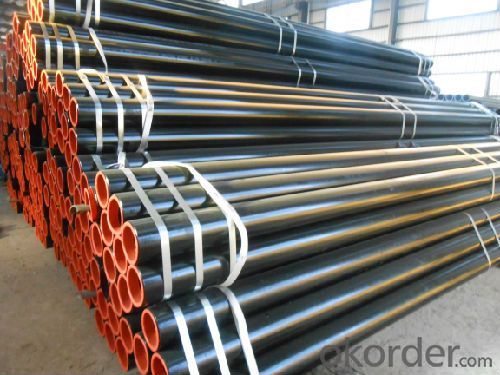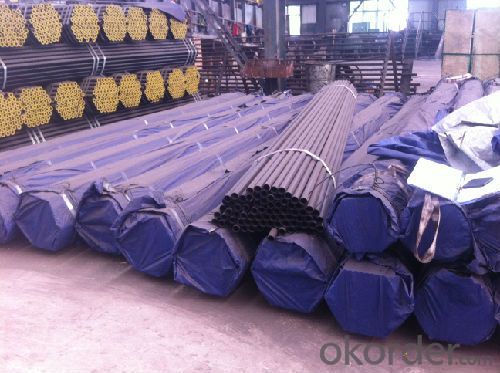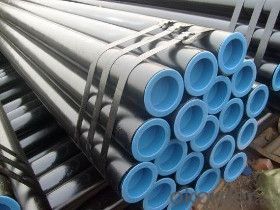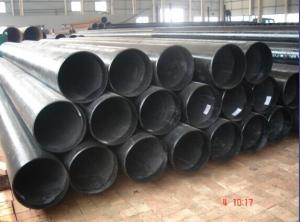API Seamless Steel Pipes from large Group
- Loading Port:
- China Main Port
- Payment Terms:
- TT or LC
- Min Order Qty:
- 30 m.t.
- Supply Capability:
- 12000 m.t./month
OKorder Service Pledge
OKorder Financial Service
You Might Also Like
1、Structure of Seamless Pipe ASTM A106/53:
carbon seamless steel pipes are widely used in gas, water and oil, transpotation;constructions;Bridge,highway,windows of model steel door; building materials;fences;heating facilities Fluid Pipe;conduit pipe,scaffolding pipe.etc.
Payment Terms: L/C D/A D/P T/T
Packing and shipment
Packaged in bundles,as per customers' requirements, it can also bepackagesd as beveled ends, typed marking, black painting, plastic caps protection,woven bags packing
For 20" container the max length is 5.8m; For 40" container the max length is 12m. other options are available based on customer requests. Please discuss when placing orders.
Standard: GB/T8162-2008; GB/T8163-2008; GB3087-2008; GB5310-2008; GB9948-2006; ASTM A106/A53 GR.B; API 5L GR.B
Application: Fluid pipes, structural pipes, oil and gas pipes
Packaging: bare/paint, bevelled ends, caps
Material: 20#, Q345B (16Mn)
Outside diameter: 89mm-820mm
Wall thickenss: 4mm-45mm
2、Main Features of the Seamless Pipe ASTM A106/53:
• High manufacturing accuracy
• High strength
• Small inertia resistance
• Strong heat dissipation ability
• Good visual effect
• Reasonable price
3、Seamless Pipe ASTM A106/53 Specification:
Standard | GB, DIN, ASTM ASTM A106-2006, ASTM A53-2007 |
Grade | 10#-45#, 16Mn 10#, 20#, 45#, 16Mn |
Thickness | 8 - 33 mm |
Section Shape | Round |
Outer Diameter | 133 - 219 mm |
Place of Origin | Shandong, China (Mainland) |
Secondary Or Not | Non-secondary |
Application | Hydraulic Pipe |
Technique | Cold Drawn |
Certification | API |
Surface Treatment | factory state or painted black |
Special Pipe | API Pipe |
Alloy Or Not | Non-alloy |
Length | 5-12M |
Outer Diameter | 21.3-610mm |
Grade | 20#, 45#, Q345, API J55, API K55, API L80, API N80, API P110, A53B |
Standard | ASME, ASTM |
4、Packaging & Delivery
Packaging Details: | seaworthy package,bundles wrapped with strong steel strip |
Delivery Detail: | 15-30days after received 30%TT |
5、FAQ of Seamless Pipe ASTM A106/53:
①How is the quality of your products?
Our products are manufactured strictly according to national and internaional standard, and we take a test
on every pipe before delivered out. If you want see our quality certifications and all kinds of testing report, please just ask us for it.
Guaranteed: If products’ quality don’t accord to discription as we give or the promise before you place order, we promise 100% refund.
②How about price?
Yes, we are factory and be able to give you lowest price below market one, and we have a policy that “ for saving time and absolutely honest business attitude, we quote as lowest as possible for any customer, and discount can be given according to quantity”,if you like bargain and factory price is not low enough as you think, just don’t waste your time.Please trust the quotation we would give you, it is professional one.
③Why should you chose us?
Chose happens because of quality, then price, We can give you both.Additionally, we can also offer professional products inquiry, products knowledge train(for agents), smooth goods delivery, exellent customer solution proposals.Our service formula: good quality+good price+good service=customer’s trust
SGS test is available, customer inspection before shipping is welcome, third party inspection is no problem.
6、Seamless Pipe ASTM A106/53 Images:



- Q:What are the different types of pipe coatings used for corrosion protection?
- There are several different types of pipe coatings used for corrosion protection. These coatings are applied to the exterior surface of pipes to prevent or delay corrosion, ensuring the longevity and integrity of the pipes. Some of the commonly used pipe coatings for corrosion protection include: 1. Fusion-Bonded Epoxy (FBE) Coatings: FBE coatings are widely used for corrosion protection due to their excellent adhesion and resistance to chemicals, moisture, and abrasion. These coatings are applied by heating the pipe and spraying it with epoxy powder, which then melts and forms a protective layer upon cooling. 2. Polyethylene (PE) Coatings: PE coatings are known for their flexibility and resistance to impact and chemicals. These coatings are typically applied by extrusion or wrapping methods and provide excellent resistance against water, soil, and other corrosive substances. 3. Polyurethane (PU) Coatings: PU coatings offer good resistance to chemicals, moisture, and mechanical damage. They are commonly used for underground pipelines and are applied by spraying or brush coating methods. 4. Coal-Tar Enamel Coatings: Coal-tar enamel coatings are suitable for protecting pipes exposed to highly corrosive environments such as marine conditions or underground applications. They are typically applied by hot or cold wrapping methods and provide excellent resistance to water, acids, and alkalis. 5. Metallic Coatings: Metallic coatings such as zinc, aluminum, or zinc-aluminum alloys are often used as sacrificial coatings to protect the underlying steel pipes. These coatings corrode preferentially, sacrificing themselves to protect the pipe from corrosion. 6. Asphalt Coatings: Asphalt coatings provide a robust barrier against moisture, chemicals, and soil. They are typically applied by hot or cold wrapping methods and are commonly used for underground pipelines. It is important to consider factors such as the specific environment, temperature, and expected lifespan of the pipes when selecting the appropriate type of pipe coating for corrosion protection.
- Q:Can steel pipes be bent or shaped to meet specific requirements?
- Yes, steel pipes can be bent or shaped to meet specific requirements through various techniques such as hot bending, cold bending, or using specialized machinery like pipe benders.
- Q:Can steel pipes be used for LNG terminals?
- Yes, steel pipes can be used for LNG terminals. Steel pipes are commonly used in the construction of infrastructure for LNG terminals due to their strength, durability, and resistance to extreme temperatures. They can effectively handle the high-pressure requirements and the cryogenic temperatures involved in the storage and transportation of liquefied natural gas.
- Q:What is the difference between steel pipes and polyethylene pipes?
- Steel pipes are made of a strong and durable material, steel, which makes them suitable for high-pressure and high-temperature applications. They are also resistant to corrosion, making them ideal for transporting liquids and gases. On the other hand, polyethylene pipes are made of a flexible plastic material, which makes them easier to install and handle. They are lightweight, resistant to chemicals, and have a low risk of corrosion. However, they may not be suitable for very high-pressure or high-temperature applications.
- Q:Are steel pipes suitable for industrial applications?
- Steel pipes are an excellent choice for industrial applications. They come with several advantages that make them the preferred option in various industries. Firstly, their strength and durability are exceptional, enabling them to withstand high pressure and heavy loads. This makes them perfect for transporting liquids, gases, and solids. Furthermore, steel pipes exhibit high resistance to corrosion, a critical feature in industrial settings where exposure to harsh chemicals, moisture, and extreme temperatures is common. Their corrosion-resistant properties ensure a longer lifespan and reduce the need for frequent maintenance and replacements. Additionally, steel pipes have a smooth interior surface, minimizing friction and allowing for efficient material flow. This is particularly vital in industries like oil and gas, where the smooth flow of fluids is essential for proper operations. Moreover, steel pipes offer a wide range of sizes and thicknesses, allowing for customization and flexibility in design. They can be easily welded and connected, facilitating simple installation and modification as per specific industrial requirements. Overall, steel pipes provide a combination of strength, durability, corrosion resistance, and versatility, making them highly suitable and widely used in various industrial applications such as oil and gas, construction, water treatment, power generation, and chemical processing.
- Q:How are steel pipes coated for protection?
- Steel pipes are commonly coated for protection through a process called galvanization. This involves immersing the pipes in a bath of molten zinc, creating a protective layer that prevents corrosion and extends their lifespan. Additionally, other methods such as epoxy coatings or polyethylene wrappings can be used to provide additional protection against external factors.
- Q:Can steel pipes be used for stadium construction?
- Yes, steel pipes can be used for stadium construction. Steel pipes are commonly used in stadium construction due to their strength, durability, and ability to withstand heavy loads. They can be utilized for various purposes such as supporting the stadium structure, creating frames for roof structures, and facilitating the installation of plumbing and electrical systems. Additionally, steel pipes can be easily fabricated, allowing for efficient construction and customization according to the specific requirements of the stadium design.
- Q:What are the common fittings and accessories used with steel pipes?
- There are several common fittings and accessories used with steel pipes in various applications. These fittings and accessories are essential for connecting, redirecting, controlling, and supporting the flow of fluids or gases through the pipe system. One of the most commonly used fittings is the steel pipe elbow, which allows for a change in direction of the pipe. Elbows are available in different angles, such as 45 degrees or 90 degrees, to accommodate specific piping needs. They are used to prevent sharp bends that could cause flow restrictions or pressure drops. Another common fitting is the steel pipe tee, which has three openings in the shape of a "T". Tees are used to create branch connections to redirect the flow of fluids or gases into multiple directions simultaneously. Steel pipe reducers are fittings used to connect pipes of different sizes. They come in two types, concentric reducers and eccentric reducers. Concentric reducers have a symmetrical design and allow for a smooth transition between pipes of different diameters. Eccentric reducers, on the other hand, have an offset design and are used when there is a need to align pipes at different levels. Couplings are fittings used to join two pipes together. They come in different types, such as threaded or socket weld couplings, and provide a secure and leak-proof connection between pipes. Flanges are another common accessory used with steel pipes. They are flat, round plates with holes in the center that allow for the connection of pipes, valves, or other equipment. Flanges are typically used in applications that require easy access for inspection, cleaning, or maintenance. Other common fittings and accessories include steel pipe caps, which are used to seal the ends of pipes, and steel pipe nipples, which are short lengths of pipe used to extend or connect two fittings. It is important to note that the selection of fittings and accessories for steel pipes depends on the specific application, such as the type of fluid or gas being transported, the pressure and temperature requirements, and the overall system design. Consulting with a professional or referring to industry standards is recommended to ensure the correct fittings and accessories are chosen for a particular steel pipe system.
- Q:Are steel pipes suitable for nuclear power plants?
- Yes, steel pipes are suitable for nuclear power plants. Steel is a commonly used material in the construction of nuclear power plants due to its excellent mechanical properties, high strength, and durability. Steel pipes are used in various applications within these plants, including the transportation of cooling water, hot gases, and steam. The steel used in nuclear power plants is carefully selected and tested to meet stringent safety regulations and quality standards. It is crucial for these pipes to have excellent resistance to corrosion and high-temperature environments, as they are exposed to harsh conditions such as high pressure, high temperatures, and radioactive materials. Furthermore, steel pipes have a long service life and require minimal maintenance, making them a cost-effective choice for nuclear power plants. They can withstand extreme conditions, ensuring the safe and reliable operation of the plant. Additionally, steel pipes can be easily fabricated, installed, and repaired, which is essential for the efficient functioning of a nuclear power plant. Overall, steel pipes are highly suitable for nuclear power plants due to their strength, durability, resistance to corrosion, and ability to withstand extreme conditions.
- Q:Can steel pipes be used for conveying corrosive substances?
- Steel pipes can be used for conveying corrosive substances, but it is important to choose the right type of steel and consider additional protective measures. Stainless steel pipes, for example, are highly resistant to corrosion and can handle a wide range of corrosive substances. However, it is crucial to consider the specific corrosive properties of the substance being conveyed and the concentration levels. In some cases, additional protective coatings or linings may be necessary to prevent corrosion and ensure the longevity of the steel pipes. Regular maintenance and inspection are also essential to detect and address any signs of corrosion to prevent leaks or failures in the piping system. Overall, steel pipes can be used for conveying corrosive substances, but proper material selection, protective measures, and maintenance are vital to ensure safe and efficient operations.
1. Manufacturer Overview |
|
|---|---|
| Location | |
| Year Established | |
| Annual Output Value | |
| Main Markets | |
| Company Certifications | |
2. Manufacturer Certificates |
|
|---|---|
| a) Certification Name | |
| Range | |
| Reference | |
| Validity Period | |
3. Manufacturer Capability |
|
|---|---|
| a)Trade Capacity | |
| Nearest Port | |
| Export Percentage | |
| No.of Employees in Trade Department | |
| Language Spoken: | |
| b)Factory Information | |
| Factory Size: | |
| No. of Production Lines | |
| Contract Manufacturing | |
| Product Price Range | |
Send your message to us
API Seamless Steel Pipes from large Group
- Loading Port:
- China Main Port
- Payment Terms:
- TT or LC
- Min Order Qty:
- 30 m.t.
- Supply Capability:
- 12000 m.t./month
OKorder Service Pledge
OKorder Financial Service
Similar products
New products
Hot products
Related keywords


































